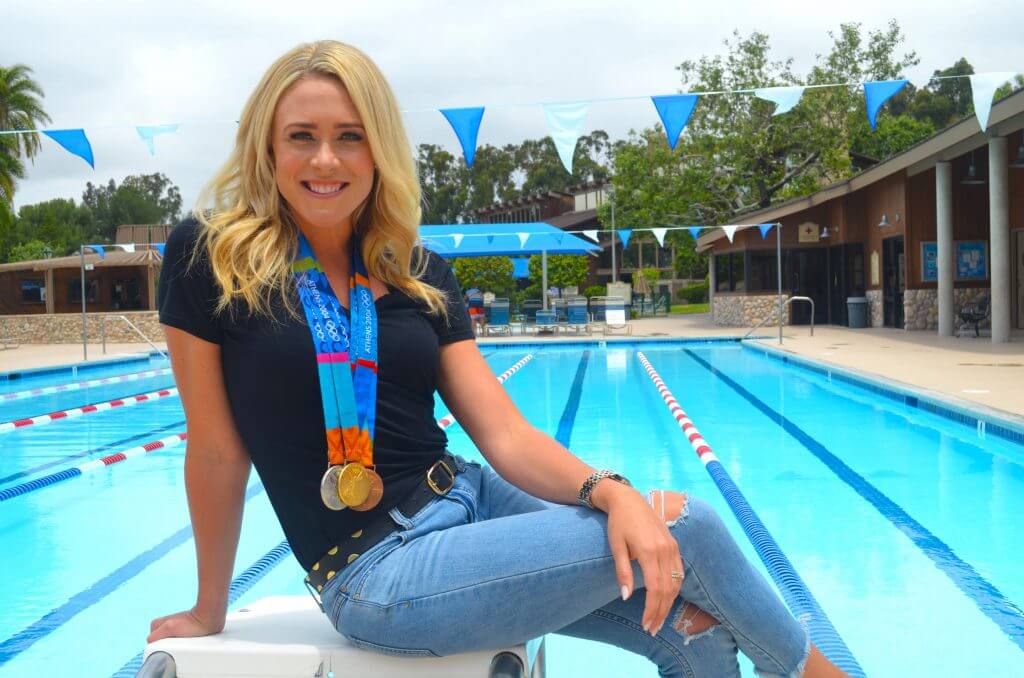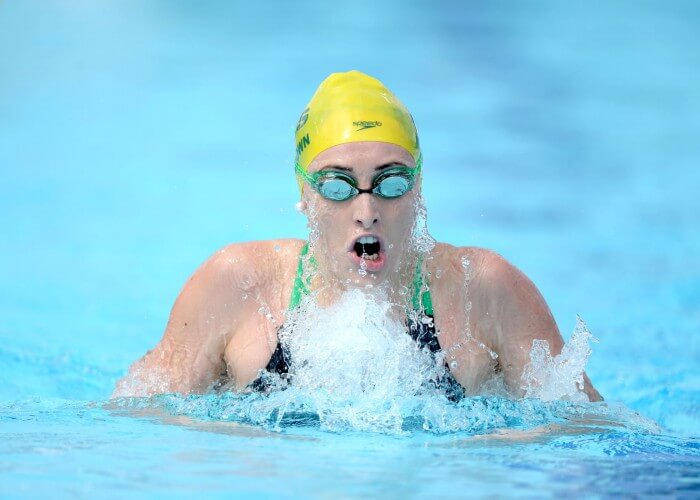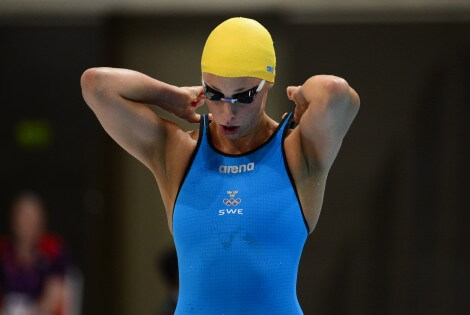10 Things Olympians Wish They Could Tell their Younger Selves

By Daniela Navarrete, Swimming World College Intern.
Being one year away from the Olympics, swimmers from all over the world look forward to qualifying. It could mean achieving an A or B-cut, participate in National trials to come in as one of the fastest two, or being selected by FINA through the universiality rule. In any way, for all of them it is not only about the pool training but a full preparation program. Here are ten things Olympians wish they could tell their younger selves, with a diverse selection fo athletes interviewed for their thoughts.
1. Nutrition is Important (Kaitlin Sandeno, United States)
“Looking back, my nutrition was very mediocre,” confesses former Olympic gold medalist, world champion and record-holder, Kaitlin Sandeno. “I definitely put in the work in the pool and in the weight room, but my nutrition could have been so much better.”
The DC Trident GM wishes someone would have told her more about proper options for quick meals to consume. Sandeno is aware of how nutrition has evolved over the years and how easy it is to get information about the subject nowadays. Nonetheless, she also owes it to her husband Peter Hogan, who as a nutritionist has been a great source of knowledge for her.
2. Do Not Forget to Sleep! (Abbas Qali, Kuwait)
A first time Olympian in 2016, Abbas Qali affirms that sleep was crucial in his preparation toward the Games. “I wish someone told me about the importance of sleep and recovery when I was younger,” shares the former University of Alabama student-athlete. “Going to bed at 1 and waking up at 5:15 for 6am practice won’t help anyone.”
Qali changed his sleeping habits during his last years of college and realized that getting the correct sleeping hours to allow the body to recover, could actually help him improve. “If I would have started earlier, maybe I would have dropped more times,” says Qali. He failed to achieve the Olympic B-cut 13 times until he got it on the 14th try. “You never know, probably I would have increased my chances for sure.”
3. The Pool By Itself is Not Enough (Dirngulbai Misech, Palau)
Dirngulbai (UB) Misech, a Rio 2016 Olympian for the country of Palau, an island located in Oceania, east of Philippines, says pool training is not the only thing one should focus on as a high-performance athlete. “It is not all about swimming when it comes to training,” says the Lincoln College (D2) senior. “Your body will benefit from other forms of training outside the pool, such as dryland or weights.” It is true that in-water practices are crucial in any swimmer’s preparation; yet, land training is also key.
One of the best pieces of advice that UB got growing up was to get comfortable with being uncomfortable. “This doesn’t necessarily mean to take your body to a breaking point, but you must push yourself past certain limits to really see what you are capable of.” She has taken this motto in and out of the pool as she tells younger kids that anything done on land is just as important.
4. Treat Any Race as an Olympic Final (Taylor McKeown, Australia)

Photo Courtesy: Delly Carr
At times, there are swimmers who compete at meets where they outshine the rest. These athletes would usually win the sprints by a body length or lap others in the distance events. Nonetheless, they should not take those meet or races for granted. Sometimes overconfidence could take over the experts and the underdogs can also succeed.
Australian Olympic finalist Taylor McKeown wishes someone would have told her that every race is important, regardless if is a local meet, a national championship, or the Olympic Games. “Practice embracing nerves, adrenaline and how you are going to focus on your own race plan under those conditions,” says the Rio 2016 silver medalist. “The best athletes are the ones who are most adaptable to any foreseen situation.”
5. Take Every Chance and Own it (Abdoul Niane, Senegal)
Senegalese Olympian Abdoul K. M. Niane learned to swim at age 14 after being a multisport athlete throughout his childhood. “When I was younger, I wasn’t planning on becoming a swimmer, but when I started, I wish someone could have told me one that day I could be an Olympian,” reflects Niane. “Maybe it would have motivated me more 10-12 years ago.” He never thought he would be part of the Senegal National Team, but he took the chance and owned it.
“Once I heard a coach tell his swimmer who was seeded in lane eight for a final said, ‘if you have a lane, you have a chance.’ Right after the swim, he made a PB and won a bronze medal. Since then, whenever I am in a calling room before a race I remember: one lane, one chance.”
Now a coach in Monaco, every day he instills his kids to take advantage of the opportunity they have to practice the sport and get better.
6. Be Ready, You Are Ready (Brett Hawke, Australia)
One of the best pieces of advice the two-time Olympian ever received was from Don Talbot: “You have two arms and two legs like all of your competitors, figure out how to beat them.” Hawke carried that with him throughout his career and further in his life. Now as a coach, the former Australian record holder has swayed his swimmers on readiness.
“Prepare yourself for the moment of truth,” says the 17-time Auburn All-American. Hawke wishes someone had told him that being ready does not only mean to be ready before a big race, but since the very beginning of the process. “It is something that needs training from day one of the season,” states Hawke. “We prepare for the big moment way before the big race.” This is something the former Auburn head coach has told the athletes that have passed under his hands. “Day one should start to prepare you for the last day, that’s the whole point of starting, to end somewhere.”
7. Focus on What You Can Control (Ricardo Monasterio, Venezuela)
We all have had a meet when everything turned out perfect. The training was great, we are well-rested, the pool is fast, and we swim personal bests. But what happens when the water temperature is extremely cold or warm? Or you are in an outdoor pool and the wind is too strong?
“I wish someone had reminded me of not to worry about the uncontrollable,” shares the four-time Olympian for Venezuela, Ricardo Monasterio. “Especially in important competitions such as the Olympic games, the athlete wishes that everything goes perfectly fine and according to what was planned.” The University of Florida All-American and current Azura Florida Aquatics coach asserts anything could happen at such meets, but it is on us to face the situation and focus on not losing our minds when these things come our way.
8. Not Making it is Not Failure; Value Yourself as a Human Being (Fernanda Gonzalez, Mexico)
Olympic swimmers usually have a “strive for more” mentality. Two-time Mexican Olympian and national record holder, Fernanda Gonzalez is not the exception. “I had never been the type of swimmer that would take breaks from the pool; I push myself to the limit all the time,” says the Central American multi-medalist. “However, that pushing has led me to deal with several injuries and surgeries throughout my career.” There are times when elite athletes are so immersed on their sport that they start losing themselves.
Gonzalez often felt she would put so much pressure on herself that when she did not achieve a cut or break a record, she saw herself as an absolute failure. “I wish someone could have told me that nothing happened if I didn’t make it,” expresses Gonzalez. “Before being a competitive swimmer, before being an Olympian, I am Fernanda, a human being, and a woman.”
9. Make Sure You Enjoy the Journey! (Jennie Johansson, Sweden)

Photo Courtesy: Kyle Terada-USA TODAY Sports
Two-time Olympian Jennie Johansson had a goal to make the final of the 100m breaststroke in the London Olympics. “That goal was always in focus in everything I did, ‘because you should always strive for your goals,’ they said.” However, the 2015 world champion in the 50m breaststroke, missed the final by a few hundreds of a second.
After missing a goal, Johansson confesses she would first allow herself to be disappointed for a short time. But then, after disappointment comes change. “With some adjustments, smaller or bigger ones, I would continue the journey to achieve my next goal.” Eventually, Johansson followed the road to the next Olympics but promised herself to enjoy the journey, not so much the results. She had goals and reasons to step out of bed every morning, yet she got better at enjoying every little bit of what swimming gave her. “It will give you friends and memories for a lifetime, so make sure you enjoy it and the results will be a bonus!”
10. You Belong Here (Naomi Ruele, Botswana)
Even the most hard-working, talented swimmers have felt that they do not fit in. That is the case of Botswana Olympian Naomi Ruele. “I wish someone had told me I belonged there,” says Ruele. “I am very much confident in myself as a person, but I have had looming issues with swimming.”
Ruele has been the first swimmer of her country to ever achieve a qualifying Olympic B-cut. “For the most part I know my talents but prior to the Games [Rio 2016], I wish I knew my worth and belonging on the pool deck as well as I do now.” With time, the FIU alumna, conference champion and NCAA qualifier, has been able to understand that she is a top swimmer that is worthy of success. “I can respect lots of people more talented than I am, but I am for sure also someone who is also talented and deserving.”
-All commentaries are the opinion of the author and do not necessarily reflect the views of Swimming World Magazine nor its staff.




Thanks, a great read.
Thanks for sharing with lot of different swimmers around the world.
Very Good article. I think that parents and trainera shoyld be more into the sport so the competirors Have better formación and a real high sport formación. Than you Daniela